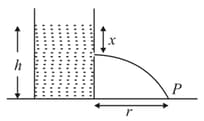Bernoulli’s Theorem
Bernoulli’s Theorem: Overview
This topic covers concepts, such as, Bernoulli's Theorem, Conditions on Bernoulli's Theorem, Properties of Ideal Fluid & Motion of the Ping-Pong ball etc.
Important Questions on Bernoulli’s Theorem
Calculate the rate of flow of glycerine of density through the conical section of a pipe if the radii of its ends are and the pressure drop across its length is
A laminar stream is flowing vertically down from a tap of cross-section area 1 cm2. At a distance 10 below the tap, the cross-section area of the stream has reduced to 1/2 cm2. Find the volumetric flow rate of water from the tap
A cylindrical vessel open at the top is 20 cm high and 10 cm in diameter. A circular hole whose cross-sectional area 1cm2 is cut at the centre of the bottom of the vessel. Water flows from a tube above it into the vessel at the rate 100 cm3 s-1 . Find the height of water in the vessel under steady state.
How does Newton's third law apply ping pong?
What law of motion is ping pong?
Are ping pong balls pressurized?
How does the floating ping-pong ball work?
What is the force of a ping-pong ball?
A non-spinning ball is not subjected to the Magnus effect. This Magnus effect is equivalent to :
Which of the following forces are acting on a non-spinning ball during its flight:
Motion of ball without spin in air follow the path
If pressure on the ball at the top be and bottom be then for ball moving without spin
When the moves with spin in air then at its top and bottom part pressures are represented by and respectively then which of the following are correct.
Motion of ball with spin in air follow the path
Potential energy term of Bernoulli's equation is not considered for its application in:
The potential energy term in Bernoulli's equation is present due to:
Bernoulli's theorem is a restatement of :
The figure below shows a cylindrical tank filled with water upto a height A hole is punctured on the side of the tank, at a distance below the water level. Water exits the hole and hits a point (at a distance from the base of the tank). Which of the following is true ?

A cylindrical vessel of radius is filled with water up to a height of . The cylinder is open to atmosphere at the top. A small aperture of radius is made on the side of the cylinder at a height of from the bottom of the vessel. For approximately how long will water leak out of the aperture?
Water from a tap emerges vertically downwards with an initial speed of . The cross sectional area of the tap is . Assume that the pressure is constant throughout the stream of water and that the flow is streamlined. The cross sectional area of the stream, below the tap would be:
(Take )
